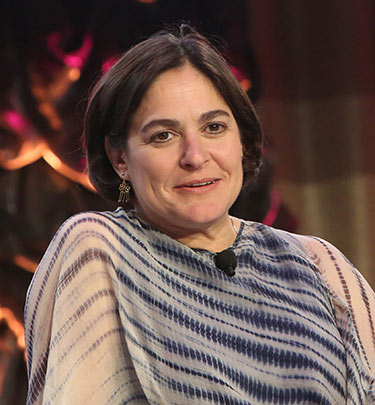Israeli Scene
News + Politics
Prominent Journalist Caroline Glick Seeks Knesset Seat

Caroline Glick, 49, is a prolific writer and articulate spokeswoman for the right wing in Israel. A longtime columnist for The Jerusalem Post who moved to Israel from Chicago at the age of 21, she has left the newspaper to enter politics as a candidate for the New Right Party, headed by Education Minister Naftali Bennet and Justice Minister Ayelet Shaked. The party is expected to win enough seats in the April 9 national elections to assure her a spot in the Knesset. She continues to write for the online conservative American outlet Breitbart News. We caught up with her at her home in the West Bank Jewish settlement of Efrat, where she lives with her two young sons. This interview has been edited for brevity and clarity.
Why did you decide to enter politics after so many years as a journalist?
I spent 18 years in journalism doing a deep analysis of what’s going on in and around Israel. I want to try to do some things, not just stand on the sidelines and talk about it. When Naftali and Ayelet asked me to run with them, I said, “This is the right time in terms of my kids’ ages, they’re not babies anymore, and in terms of where I am in my writing.” I thought, “O.K., let’s do it. And they’re the right people to do it with.”
Bennet believes that Israel should annex Area C, the 60 percent of the West Bank that is under complete Israeli control and includes the bulk of Jewish settlements. In your 2014 book, The Israeli Solution: A One-State Plan for Peace in the Middle East, you call for Israeli annexation of the entire West Bank. What do you think should happen?
While I still think my view is correct, I’ve seen over the past couple of years more and more advantages to just taking on Area C and applying Israeli law permanently. The main advantage is that we get rid of the military government, which was formed in 1967 and was not intended to be a long-term prospect. The army should not be involved in governance, it should be involved in defense.
What was your army experience?
I volunteered to serve since they didn’t draft women over the age of 20. After taking the officer’s course, I ended up in the office of the judge advocate general, where they gave me a book that had been started about Israel’s handling of the Palestinian uprising and asked me to finish writing it. Then I went to the unit that was in charge of the military government in Judea, Samaria and Gaza. In June 1994, they brought me in to coordinate the talks with the Palestinians in the framework of the Oslo peace process. I spent five and a half years in the army and finished with the rank of captain.
Did you ever think the Oslo process would lead to peace?
No. The Oslo process was not then-Prime Minister Yitzhak Rabin’s idea. Shimon Peres and Yossi Beilin did the whole thing behind his back, privately negotiating with Mahmoud Abbas, the current president of the Palestinian National Authority. The Palestine Liberation Organization was just lying to us, and undermining everyone on the ground who wanted peaceful coexistence with us.
Have you encountered sexism in your career?
I’ve run into a fair amount of chauvinism. I’m always surprised by it, because it’s the exception, not the rule. When it happens, I’m sort of blindsided: Did he just ask me to make him coffee? When I was in the army, there was a lot of sexual harassment. I learned to fight back and not to be a victim. A brigadier general tried to put a hand on me, and I smacked him across the face. He took it, because it had nothing to do with the army—it was about a man mistreating a woman.
Linda Gradstein, a freelance journalist based in Jerusalem, teaches journalism at New York University-Tel Aviv.









 Facebook
Facebook Instagram
Instagram Twitter
Twitter
Leave a Reply